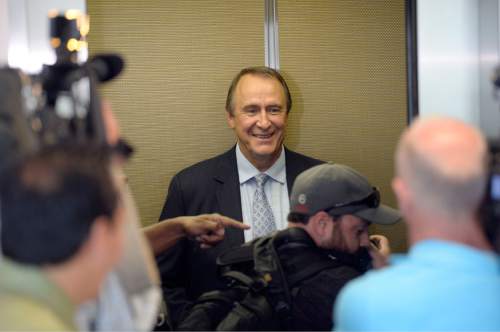This is an archived article that was published on sltrib.com in 2015, and information in the article may be outdated. It is provided only for personal research purposes and may not be reprinted.
Here is a look at the amended charges against former Utah Attorney General Mark Shurtleff and the allegations behind them:
Count 1 • Accepting a prohibited gift, a second-degree felony
This charge alleges that Shurtleff accepted a trip to the luxurious Pelican Hill Resort in California from Marc Sessions Jenson, a developer who says he had paid Shurtleff associate Tim Lawson $120,000 for help with criminal securities charges. Jenson paid for lodging and massages, golf, food and clothing for Shurtleff and his then-campaign fundraiser John Swallow, according to Jenson and receipts from the trip.
Count 2 • Accepting a prohibited gift, a third-degree felony
In June 2009, Shurtleff and Swallow again traveled to Pelican Hill, with Jenson again paying for lodging and expenses, according to court documents.
Count 3 • Obstructing justice, a class A misdemeanor
Shurtleff allegedly made a series of false statements to FBI agents in a May 6, 2013, interview. He allegedly "provided numerous pieces of false information," including those concerning his office's plea-negotiation practices, campaign donations "and gifts or bribes received by him," according to an earlier court document.
Count 4 • Bribery to dismiss a criminal proceeding, a second-degree felony
In a May 8, 2009, meeting at a Mimi's Cafe, Shurtleff allegedly told business executive Darl McBride that he would raise $2 million from Jenson to pay back McBride for a failed investment with a former Jenson associate named Mark Robbins. Shurtleff subsequently asked Jenson for the money at the same time Jenson still owed $4 million in restitution from a plea deal with Shurtleff's office.
Count 5 • Accepting a prohibited gift, a second-degree felony
This charge alleges Shurtleff accepted a series of payments and gifts from Jeremy Johnson. The St. George businessman and related companies and individuals gave tens of thousands of dollars to Shurtleff's political campaigns. Those included $50,000 from his I Works company March 21 and 27, 2008 — dates specified in the new information — that came after several citations from the Utah Division of Consumer Protection stretching back to 2003. In about February 2011, after Johnson and I Works were sued by the Federal Trade Commission and after he had started corresponding with Shurtleff and Swallow about the legality of processing poker payments in Utah, Shurtleff stayed at a Johnson house in St. George known as the "Green House" and also took trips using Johnson's jet.
Count 6 • Obstruction of justice, a third-degree felony
The new information says this count relates to "aiding and protecting" Shurtleff's then-chief deputy, Swallow — who was running to succeed Shurtleff — in connection with a lawsuit brought by a Swallow campaign donor against Bank of America. Tim and Jennifer Bell held a fundraiser for Swallow in August 2012 after the couple had sued the bank over an attempt to foreclose on their luxury home. Despite the apparent conflict of interest, Swallow participated in discussions with Bank of America and Shurtleff signed off on dismissing the state from the lawsuit once the Bells had settled. Shurtleff then accepted a position with a law firm that has Bank of America as a client.
Count 7 • Official misconduct, a class B misdemeanor
Prosecutors appear to be using this as a kind of catchall charge. Allegations include Shurtleff's relationship with so-called "fixer" Tim Lawson; offering to provide $2 million from Mark Sessions Jenson to Darl McBride to settle McBride's claim against former Jenson associate Mark Robbins; and destroying a personal letter from Jenson. It also involves Shurtleff's actions in the Bell lawsuit against Bank of America and a "failure of duty" regarding the solicitation of campaign contributions with Swallow from October 2008 through January 2009.
Tom Harvey



